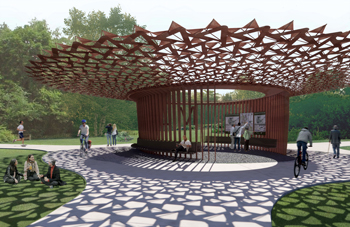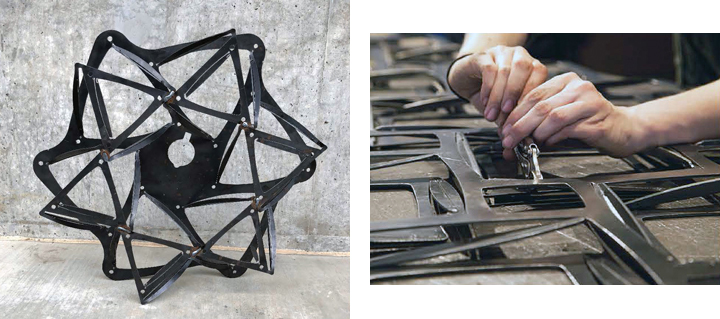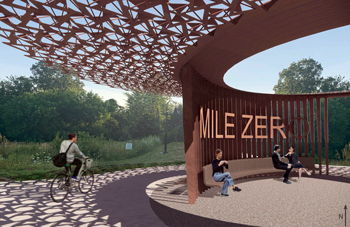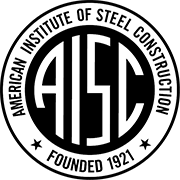AISC
Kirigami-Inspired Sculptural Steel Structure Wins 2024 Forge Prize
March 5, 2024
FOR IMMEDIATE RELEASE
CHICAGO - A stunning steel shade structure intended for the trailhead of the Razorback Greenway in Northwest Arkansas has taken the top award in the American Institute of Steel Construction’s 2024 Forge Prize.

The Forge Prize, established by The American Institute of Steel Construction in 2018, recognizes visionary emerging architects, architecture educators, and graduate students for design concepts that embrace innovations in steel as a primary structural component. The Mile Zero design team will reprise and expand on their presentation as part of the Architecture in Steel specialty conference at NASCC: The Steel Conference in San Antonio, March 20 at 10:15 a.m.
The Mile Zero concept uses an innovative Spin-Valence space frame system to cut, pull, and fasten uncoated weathering steel sheets into a modular system with structural depth. Mile Zero is a collaboration between Emily Baker, Vincent Edwards, and Edmund Harriss of the University of Arkansas; Princeton University’s Isabel Moreira de Oliveira; West Virginia University’s Eduardo Sosa; and Fayetteville, Ark.-based artist Reilly Dickens-Hoffman--and they’ll share the $10,000 grand prize.

Baker developed the Spin-Valence system when she was in graduate school. It’s based on the Japanese art of kirigami, which uses folding and cutting to create 3D objects out of a flat material. A video of the Spin-Valence system’s deployment and additional press photos are available here.
Baker and her collaborators intend to bring the design to fruition to replace the simple bollard that currently marks the beginning of a multi-use trail that spans more than 40 miles. They envision the structure, with its interplay of light and shadow, as a welcoming space for people to enjoy the outdoors together--or perhaps as a backdrop for a group photo to commemorate a long bike ride on the Greenway.

In the second phase of the Forge Prize competition, the design team partnered with Hillsdale Fabricators Chief Structural Engineer Tony Diebold, PE, to further develop their idea. “Once [Baker] described the whole Spin-Valence concept to me, I thought it was pretty innovative and seems like it could be a really interesting structural piece--but also architectural,” Diebold said, noting that the design also presented a different challenge than he’s used to. “Being an engineer, I like straight lines, and everything was cattywampus!”

Baker was able to visit Diebold at Hillsdale’s shop in St. Louis as part of the process, further developing a relationship that all involved hope will lead to the structure taking shape in the real world. “We intend to continue to support Emily and Isabel’s design development as it becomes a real project,” Diebold said, adding that Hillsdale can make particularly valuable contributions to budgeting and constructability.
“Arkansas is going to be the big winner in the long-term,” said Forge Prize Judge Reed Kroloff, Rowe Family College of Architecture Endowed Chair and dean of the Illinois Institute of Technology College of Architecture. “We thought the shade structure was remarkably innovative in the way that it took steel and used it in such an interesting fashion, with the folding and stacking. [The jury] thought it had great promise for steel as a building material.”
The Mile Zero concept was one of three visionary designs that made it to the final round of the 2024 Forge Prize, in which the designers presented their refined concepts to the jury in a YouTube livestream that is now available as a recording.
AISC would like to thank the Forge Prize jury for their time and thoughtful consideration: Samantha Flores, AIA, vice president and director of the innovation and research team at Corgan; Reed Kroloff, Rowe Family College of Architecture Endowed Chair and dean of the Illinois Institute of Technology College of Architecture; and Paul Makovsky, editor in chief of ARCHITECT, the journal of the American Institute of Architects.
###
For more information contact:
Dani Friedland
Director of Marketing Communications
773.636.8535
friedland@aisc.org
American Institute of Steel Construction
The American Institute of Steel Construction, headquartered in Chicago, is a non-partisan, not-for-profit technical institute and trade association established in 1921 to serve the structural steel design community and construction industry. AISC's mission is to make structural steel the material of choice by being the leader in structural steel-related technical and market-building activities, including specification and code development, research, education, technical assistance, quality certification, standardization, market development, and advocacy. AISC has a long tradition of service to the steel construction industry of providing timely and reliable information.
130 E. Randolph St, Suite 2000
Chicago IL 60601
312.670.2401
www.aisc.org
